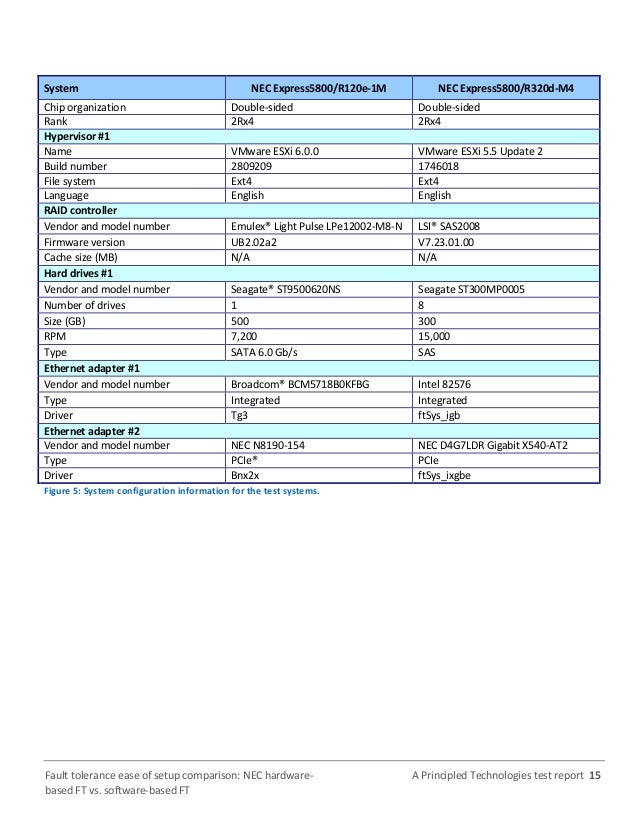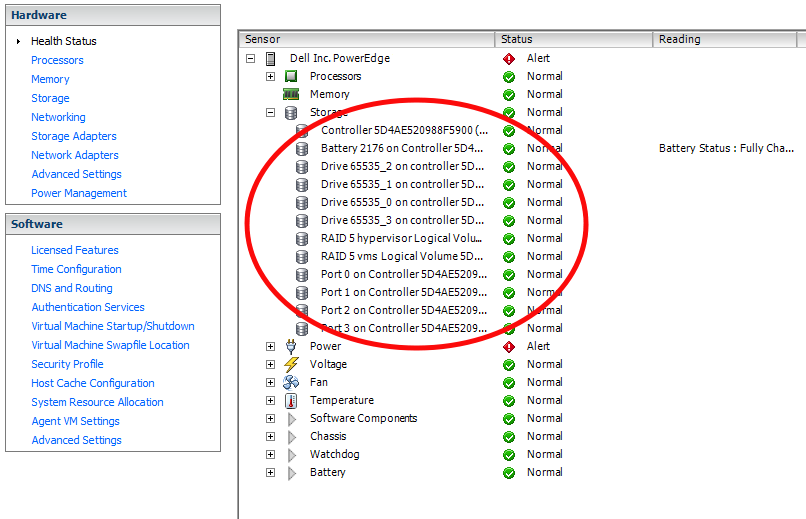Install Esxi Software Raid Vs Hardware
Running ESXi4.1 on an HP machine, with only remote access to the host ssh shell and the vmware console (no iLO), is there a way to gather a hardware report from the server? I am specifically interested in finding out whether the disks are SAS or SATA, and whether the p410i controller is equipped with NVRAM and a battery.
VMware ESXi 5.1 can be installed RAID1 Software? Unable to install grub to software Raid array in Ubuntu. Postfix SMTP outgoing gateway server, Software RAID1 vs. ESXI 5.1 RAID - 2 hard drives on install. And you see two drives when installing esxi, then it's a software raid. You'll need a hardware raid controller.
Obviously, this being a VM host, rebooting is the last resort (especially since I'm remote to the machine).
I'd also appreciate a pointer to a LiveCD I could use with this machine (in case I do have to restart it) which I could pass on to the person local to the host, so they can boot the system with the CD, gather a report, and send it over to me.
Thanks
UPD: here's a screenshot of what things look like atm:
I guess this means this ESXi has no HP-specific packages, and I need to look for another way? Or am I looking in the wrong place?
4 Answers
It's an HP server, so there should be some information about the hardware available in the vSphere client. I'm not clear if you're saying you have access to the client or not, based on your question. If you do have access, you can go to Configuration -> Health Status -> Storage to see the array setup. This only applies if you're using a version of ESXi with HP's agents/sensors built in. If the server isn't the HP-specific build, the storage array information may be missing.
Do you know the model of the HP server? That can help narrow things down, as many of the recent units with Smart Array P410 controllers have flash-backed or battery-backed write cache (BBWC) installed.
But with the host's ssh shell, you can pull the server's product name and HP part number. At the shell prompt, type:
smbiosDump egrep '(Product Serial)'
On one of my ESXi servers, that produces the following output:
Googling the 'Product ID' pulls up the HP Quick Specs for that model, showing the presence of a Smart Array P410i controller with 512MB BBWC.
As for the disks and disk types comprising the array, the normal approach is to use the HP Insight Agents and use hpacucli when using a full OS, or one of the methods listed here. That's not an option under ESXi, though. You can definitely get that info from the BIOS setup utility (press F8 at the prompt) on the server during POST.

You don't need a generic live CD to obtain full hardware specifications. The servers come with them. Use the included HP SmartStart CD (or download it). Running that will provide full insight into the hardware specs and RAID configuration.
Software Raid Linux
lspci on the command line should list your controller cards. eg
I'm sure there is a more elegant way, but to find out what kind of disks you have you can do an fdisk -l on the command line, and it tells you the model number and serial number of the disk:
eg
You may be able to get all of this information from within vCenter using the Hardware Status Page. The screenshot is of a Dell server, but these may show up for HP server - YMMV.
Try to use esxcfg-info with -w key over ssh or console. It command returns a lot of info, some of it is unique
Not the answer you're looking for? Browse other questions tagged vmware-esxihphp-prolianthp-smart-arrayraid-controller or ask your own question.


Hardware vs. Software Raid - 32Tb, 4-Drive Plex server.
Hello Homelab! I've finally gotten around to upgrading/expanding my current Plex setup. I'm moving away from my Single Socket AMD SuperMicro server to my Dell R420 I snagged few months ago. This server currently has 36Gb RAM, 4 8TB Drives, Dual E5-2440s, and a 120Gb SSD (replacing the DVD Drive).
I was hoping for some community opinion on my setup choices for this system from homelab perspective. My current plan includes:
A baremetal install of Server 2016 for direct access to hardware resources.
I have toyed with the idea of a single-instance ESX install underneath to allow me to use the hardware for other small VMs (backup DC/DHCP server, etc.) But part of me wants this to just be a baremetal powerhouse where Plex can take all the resources it wants without having to rely on a hypervisor to distribute resources. I'm open to criticisms and opinions of this, for I know many of you will disagree.All 4 front bays will be populated with 8Tb Red Pros (overkill, I know, but I got them for a killer deal I couldn't refuse); and an Internal SSD will supply the Operating system.
Transcoding cache will consist of a 24GB RAMDisk to save my SSD's write-life.
Now, here's where I'm stuck:
I'm very torn between Software and Hardware RAID with this rig. I possess an IBM M1015 I could flash to IT and use to supply passthrough for software RAID. (Alternatively, just use the onboard SAS connection?) Either way, if I went Software RAID, I'm planning to just use built-in Windows functionality - either from Disk Management or Storage Spaces to create a RAID 10 equivalent. Alternatively, I could use the current RAID Card (an H200 I believe) and do a hardware RAID 10. I know a Hardware RAID 10 of this size might hamper smaller RAID Cards, and that's my main concern of going hardware-based.
Both options include halving my precious storage (sob) to half in favor of (some) resiliency.
Lastly, I wanted to setup some form of power/cost effective 'DR' solution for my media. My plan for this is to take my old Supermicro server and load it with 'crap/cheap' disks. Once a week, that server would auto-power on and start a script that'd sync file changes with the R420. Once that finishes, it will shutdown for the week. I know hard drive power-on counts can be harsher than power on hours, but I feel like once a week, or maybe every two weeks, wouldn't be too bad? Especially as a DR solution with $30 disks? That was my plan to keep the DR solution 'Energy efficient' and 'cold'.
Software Raid Vs Hardware Raid Youtube
All criticisms are welcome, I'm just looking to get different opinions and thoughts before I deploy this setup in the coming weeks.
Thanks Everyone!